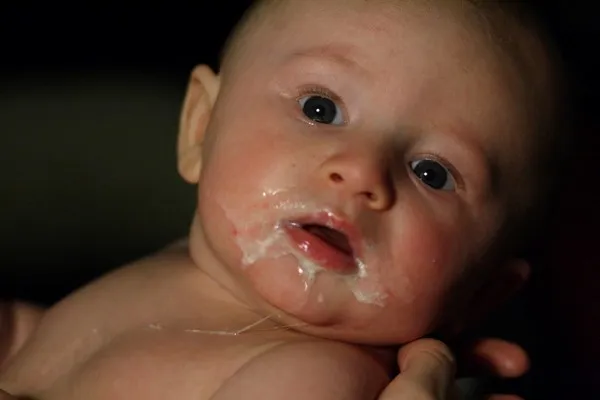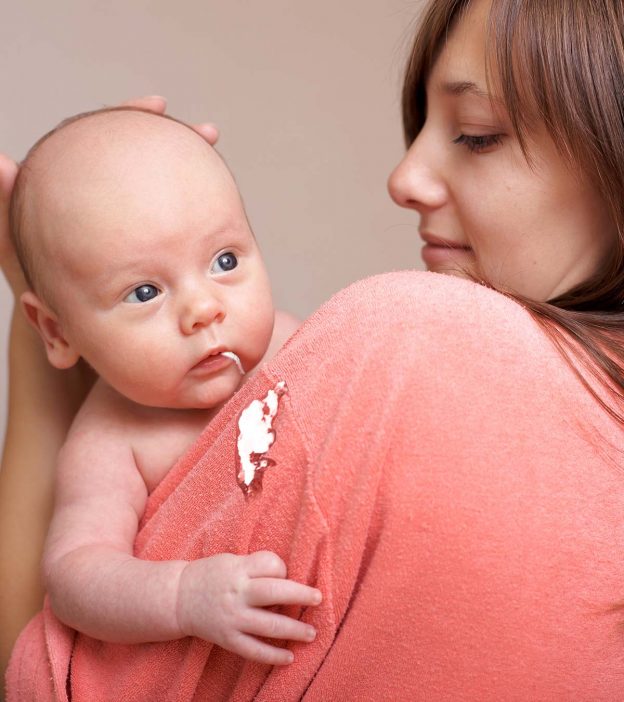Baby Spitting Out Milk: Why It Happens and What To Do
Watching your baby spit out milk can be alarming for new parents. Fortunately, in most cases, it’s a completely normal part of a baby’s development. Understanding why babies spit up and learning some easy tips to manage it can bring significant relief.
Why Do Babies Spit Up Milk?
While it can be a bit alarming to see, spitting up milk is a completely normal part of early infancy. Here’s a breakdown of why it happens so frequently:
-
Underdeveloped Digestive System: The Big Culprit A newborn’s digestive system is still growing and maturing. Importantly, the muscular valve (lower esophageal sphincter) connecting the esophagus to the stomach is relatively weak. This valve acts as a gatekeeper, but its weakness in babies means it may not fully close after feeding. This allows some milk and stomach acid to flow back up the esophagus, resulting in spit-up.
-
Tiny Tummy, Big Problem Compared to an adult’s stomach, a baby’s stomach capacity is incredibly small. Even a slight overfeeding can easily exceed their stomach’s limit, leading to the excess milk being expelled as spit-up. This is why smaller, more frequent feedings are often recommended to help reduce spit-up episodes.
-
Air Bubbles: The Gas Factor During feeding, whether by breast or bottle, babies can inadvertently swallow air. This air takes up space in their stomach, causing pressure and discomfort. To relieve this, they may spit up some milk along with the air, leading to those classic “wet burps” familiar to parents.
-
Movement Matters: The Jostling Effect Engaging in active play, tummy time, vigorous bouncing, or other movements right after feeding can contribute to spit-up. The movement jostles the milk within their still-developing digestive system, increasing the likelihood of it traveling back upward.
Additional Factors That May Play a Role:
- Food Sensitivities or Intolerances: While less common, sometimes excessive baby spit-up can be a sign of an underlying allergy or sensitivity to ingredients in breast milk or formula. Consulting your pediatrician can help determine if this might be a concern.
- Introduction to Solids: As babies begin transitioning to solids, their digestive system is adjusting. Some spitting up may occur as their body gets used to new textures and food types.
Is It Spit-Up or Something More Serious?
While spitting up milk is a common experience in babies, it’s crucial to differentiate it from a potentially more serious condition called gastroesophageal reflux disease (GERD). Here’s a deeper dive into distinguishing between the two:
Signs of Normal Spit-Up:
- Frequency: Occurs occasionally, not with every feeding.
- Quantity: Usually a small amount, often described as “wet burps.”
- Effortlessness: Appears effortless and doesn’t distress the baby.
- Weight Gain: Normal weight gain and growth patterns are observed.
- No Additional Symptoms: No other concerning symptoms like fever, blood in vomit, or frequent fussiness accompany the spit-up.
Signs of Potential GERD:
- Frequency: Occurs frequently, with multiple episodes daily or even after every feeding.
- Quantity: Larger amounts of milk are expelled, often forcefully.
- Forceful Vomiting: Projectile vomiting that may appear forceful and cause distress.
- Poor Weight Gain: The baby may not gain weight adequately or experiences weight loss.
- Other Symptoms: Additional symptoms like frequent crying, arching of the back during feeding, coughing, or trouble sleeping may be present.
- Blood in Vomit: Blood in the vomit is a serious sign and requires immediate medical attention.
When to Seek Medical Attention:
If you notice any of the following in your baby, consult your pediatrician immediately for a proper diagnosis and treatment:
- Frequent or forceful vomiting
- Projectile vomiting
- Blood in the vomit
- Poor weight gain
- Difficulty breathing or swallowing
- Persistent fussiness or crying
- Refusal to feed
Early diagnosis and treatment of GERD are crucial, as it can affect your baby’s growth and development. Your pediatrician can recommend various treatment options based on the severity of GERD, ranging from dietary adjustments and thickened feeds to medication in certain cases.
How to Minimize Spit-Up
These practical tips can help your baby experience less spit-up:
- Smaller, More Frequent Feedings: Offer smaller portions of breastmilk or formula more frequently to prevent overfilling.
- Good Burping Technique: Burp your baby frequently during and after each feeding to release any trapped air.
- Upright Position: Keep your baby upright for at least 20-30 minutes after feedings to allow gravity to help keep the milk down.
- Loose Clothing: Avoid tight-fitting clothing that can put pressure on your baby’s tummy, potentially causing discomfort and spit-up.
- Bottle-Feeding Adjustments (if applicable): Use a slow-flow bottle nipple and pace feedings with breaks to prevent overfeeding and excess air intake.
- Proper Breastfeeding Latch (if applicable): Ensure a good latch during breastfeeding to reduce the amount of air your baby swallows.
- Delay Active Play: Wait a while after feeding before engaging your baby in active play or vigorous movements.
The Mess Factor: How to Cope with Spit-Up
While taking steps to minimize spit-up is helpful, be prepared for some mess! Here’s how to handle it:
- Burp Cloths Are Your Friend: Always have a stack of burp cloths within easy reach to quickly clean up.
- Bibilicals: Keep bibs on your baby, not just during feedings, but for general wear throughout the day, to catch unexpected spit-up.
- Protect Your Home: Place washable blankets where your baby spends time, protecting furniture and carpets.
- Easy-to-Clean Clothes: Prioritize comfortable, washable clothes for your baby and yourself, as spit-up incidents are frequent.
When Will The Spitting Stop?
For most babies, spitting up peaks around 4-6 months of age and starts to improve as their digestive system matures. Typically by their first birthday, frequent spit-up is a thing of the past. However, remember, each baby is different, and some may continue with spit-up for a little longer.
Conclusion
Baby spit-up, while messy and sometimes concerning for new parents, is usually a normal and temporary phase. Implementing some easy strategies and equipping yourself with the right tools can minimize this common occurrence. If you’re ever worried about the frequency or severity of your baby’s spit-up, or if you observe other unusual symptoms alongside it, always consult your pediatrician for personalized guidance and reassurance.

